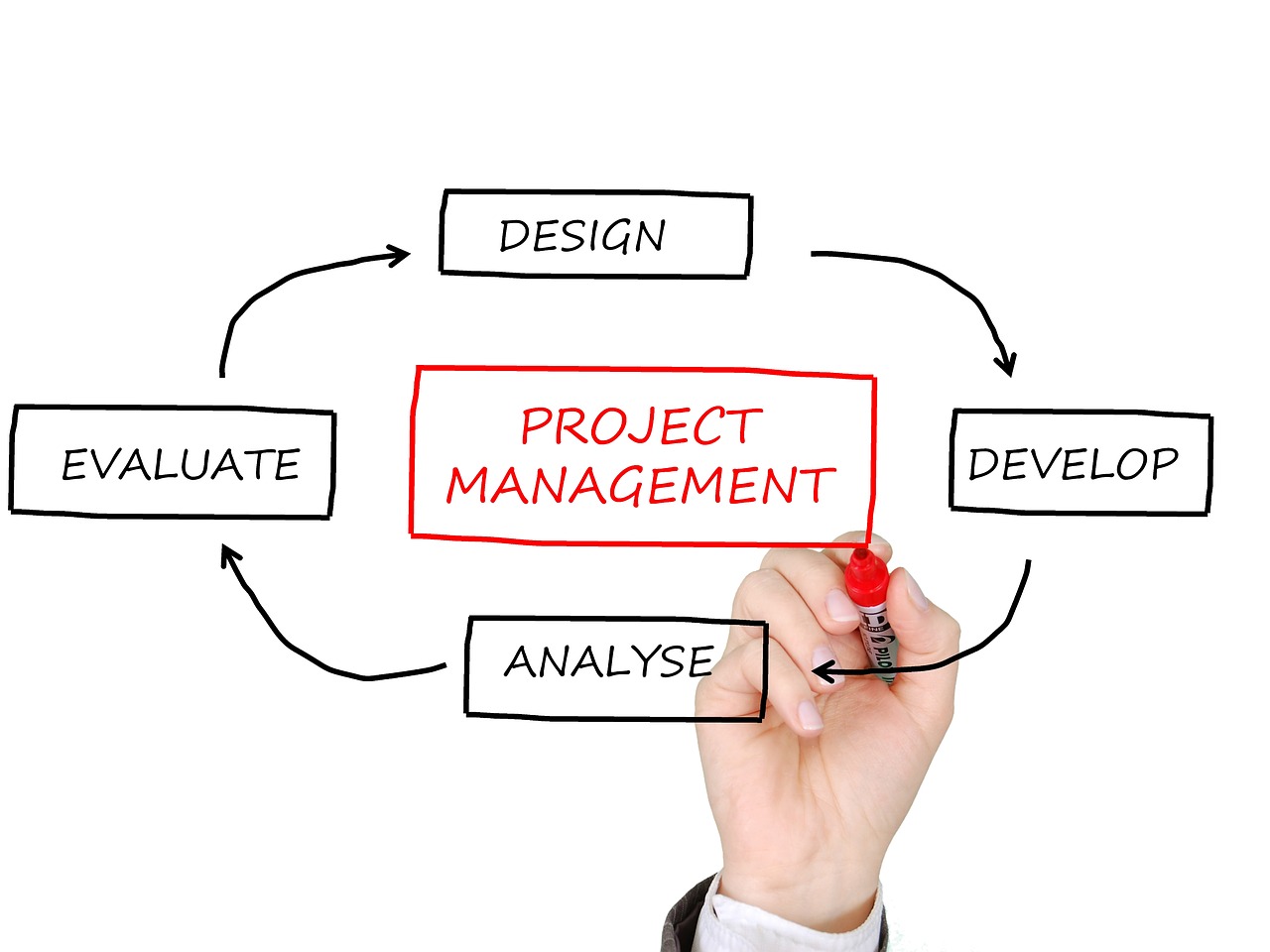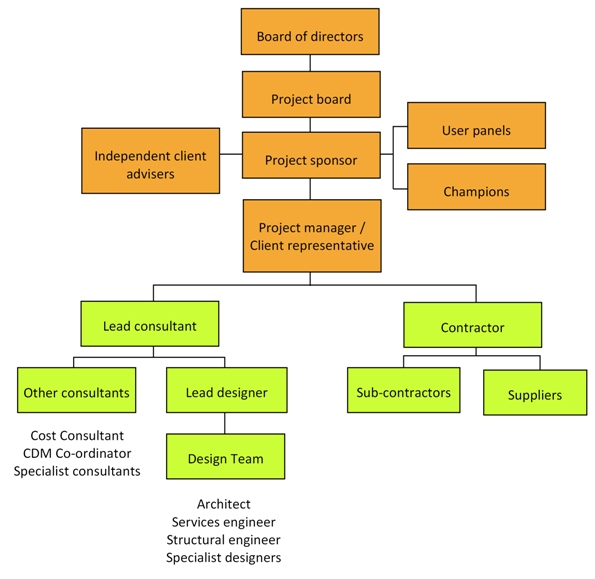Project manager

|
Contents |
[edit] What is a project manager?
A project manager (sometimes referred to as a promoter's manager or project director) is a specialist advisor that represents the client, or sometimes an employer, in the day-to-day management of a project. They seldom participate directly in activities that produce the end result but rather maintain progress and facilitate interaction and collaboration in the project team so as to reduce the risk of failure, maximise benefits and control cost.
The project manager should be appointed as early as possible in the development of the project so that they can ensure the correct structure and systems are in place from the outset.
Experienced clients may have their own in-house project managers, but If an external project manager is appointed, they function most effectively when they operate as if they were part of the client or employer organisation rather than as part of the consultant team. This allows them to issue instructions and review progress as if they were the client. During the briefing process however the project manager should allow the consultant team direct access to the client and user panels without interference.
On publicly-funded projects, a project manager might be appointed from the private sector, or an experienced project sponsor might act as project manager. The Office of Government Commerce (OGC) guidance described the project manager as: '...the named individual (often from the private sector) responsible for the day-today detailed management of the project and who provides the interface between the project sponsor and the supplier members of the project team. (Ref. Achieving Excellence in Construction Procurement Guide: Project organisation, roles and responsibilities.)
[edit] The history of project managers
Project management has existed as a function for thousands of years, but it was in the USA in the 1950s that project management began to emerge as a formal role. This was the period when processes such as the program evaluation review technique (PERT), and the critical path method (CPM) became increasingly popular as the benefits of structured project management became apparent.
The International Project Management Association and the Project Management Institute were established in the 1960’s, and the Association for Project Management (APM) was created in the UK in 1972.
The role has evolved considerably with the development of computers and digital project control systems, and as projects have become more complex, so the prominence of project managers has increased, both as overall managers of projects, but also within individual organisations such as client and contracting organisations, and as managers of parts of projects.
[edit] What are the main roles of a project manager?
The main roles of a project manager include:
- Heling the client develop their preliminary business case and initial strategic brief.
- Advising on the selection and appointment of the consultant team (and perhaps managing the appointment process).
- Helping the client organise themselves and identify the roles and responsibilities of client representatives, champions and user panels.
- Issuing information and instructions on behalf of the client.
- Developing a project execution plan, including selection of a procurement route and forms of contract.
- Contributing to risk management exercises.
- Contributing to value management exercises.
- Contributing to design reviews.
- Advising on the selection of contractors.
- Validating payments.
- Overseeing change control procedures.
- Advising on disputes.
- Monitoring and assessing overall client programmes and cost plans (which may include items beyond the scope of the main contract or consultant's appointments).
- Advising on the transition from construction to occupation.
- Reporting to the client.
[edit] What characteristics should a project manager have?
The success of a project manager is generally reliant on the effectiveness of the specific individual appointed rather that the reputation of the company they work for. It i important therefore that the individual selected is named in appointment documents and that they cannot be substituted without the agreement of the client.
The required characteristics of an effective project manager are:
- An ability to solve problems with intellectual rigour.
- Energy coupled with the ability to inspire others.
- Confident leadership and communication skills.
- The ability ti see the whole picture.
- Good negotiating skills.
- Understanding how to collaborate.
[edit] Where does a project manager fit in the project organisation?
The position of the project manager within the overall project organisation is illustrated below:
[edit] Related articles on Designing Buildings
- APM articles.
- Client design advisor.
- Code of practice for project management.
- Code of practice for programme management.
- Commercial management.
- Commercial manager.
- Construction project manager - morning tasks.
- David Trench - A career in projects.
- Design management.
- Dynamic conditions for project success.
- Independent client advisor.
- Interview with Paloma Hermoso, Senior Project Manager CIOB MAPM, Baker Ruff Hannon.
- Interview with Stephen Trench - Project manager.
- Lead consultant.
- Lead designer.
- Project manager's report.
- Project management.
- Project sponsor.
[edit] External references
- Association for Project Management.
- PACE Guidance on the Appointment of Contractors and Consultants P533 and 74.
- OGC AE5:The integrated project team for details of OGC project manager role.
- Skills Needed For Project Managers
Featured articles and news
A case study and a warning to would-be developers
Creating four dwellings... after half a century of doing this job, why, oh why, is it so difficult?
Reform of the fire engineering profession
Fire Engineers Advisory Panel: Authoritative Statement, reactions and next steps.
Restoration and renewal of the Palace of Westminster
A complex project of cultural significance from full decant to EMI, opportunities and a potential a way forward.
Apprenticeships and the responsibility we share
Perspectives from the CIOB President as National Apprentice Week comes to a close.
The first line of defence against rain, wind and snow.
Building Safety recap January, 2026
What we missed at the end of last year, and at the start of this...
National Apprenticeship Week 2026, 9-15 Feb
Shining a light on the positive impacts for businesses, their apprentices and the wider economy alike.
Applications and benefits of acoustic flooring
From commercial to retail.
From solid to sprung and ribbed to raised.
Strengthening industry collaboration in Hong Kong
Hong Kong Institute of Construction and The Chartered Institute of Building sign Memorandum of Understanding.
A detailed description from the experts at Cornish Lime.
IHBC planning for growth with corporate plan development
Grow with the Institute by volunteering and CP25 consultation.
Connecting ambition and action for designers and specifiers.
Electrical skills gap deepens as apprenticeship starts fall despite surging demand says ECA.
Built environment bodies deepen joint action on EDI
B.E.Inclusive initiative agree next phase of joint equity, diversity and inclusion (EDI) action plan.
Recognising culture as key to sustainable economic growth
Creative UK Provocation paper: Culture as Growth Infrastructure.























Comments
To make a comment about this article, click 'Add a comment' above.
Separate your comments from any existing comments by inserting a horizontal line.
Have project managers improved the industry?